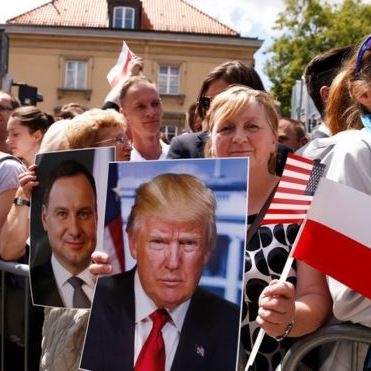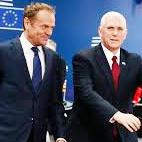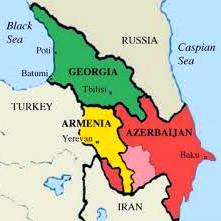Donald Trump has been the president of the United States for half a year. Over this time, observers have been trying to see through the cloud of his often controversial and conflicting statements at what might constitute his true vision of international relations. Trump’s recent speech in Warsaw was the best window into his outlook. Although he provided some good answers, the feeling after the speech was that now we have more questions than answers.
Much of the speech was focused, appropriately enough, on Poland and Polish-American relations. The president chose not to address some of the disturbing, obvious, undemocratic trends in Poland. Instead, he appeared rather supportive of the current government’s creeping offensive on civil rights. But this is hardly surprising because Trump probably sees an echo there of his own troubles in dealing with political opponents, courts, and the free media. He probably sees a natural ally in these types of foreign leaderships and it is exactly this sort of solidarity—an international of soft authoritarians—that may be emerging and finding its loudest voice in Washington. This is quite troubling. What exactly is coming out of Washington that replaces the idea of democracy promotion?[1]
One of the most controversial subjects is Trump’s position on NATO. He has called it obsolete and questioned its efficacy. This has placed doubts about America’s commitment to the alliance and its leadership of it. His preferred way of talking about NATO has been to focus on countries which, in his view, have not provided enough funds. However, his talk about European free riders that take U.S. security for granted and do not invest in security capabilities is actually nothing new. The previous U.S. administration mentioned these things on several occasions. However, the manner changed dramatically. Trump’s tone toward NATO has been harmful on many levels. In Warsaw, in a sign of encouragement, the president went beyond his former pronouncements about member states paying dues; he spoke of it as a commitment of will.
“Will” certainly matters. The treaties, agreements, international institutions, and security arrangements involved function via a sea of people, where statements by leaders matter. NATO functionality depends on policies and doctrines, which are based on facts and visions. The president of the alliance’s leading member state carries a lot of weight. Even though Trump said that the transatlantic bond is as strong as ever, it is hard to say if this is indeed true. The primary reason for this is Trump’s personal reluctance to support the institution. His personal outlook affects the state of the alliance.
Trump has been encouraged for months to publicly reassure NATO members that the United States is committed to the principle of collective defense enshrined in Article 5. Others in his administration have confirmed the U.S. commitment, but the president did not until reaching Poland. Pundits have described various vying factions in his administration, which is not unusual in itself, but serious divisions on pivotal strategic issues, such as collective defense and NATO, is something new and consequential. Why did the president delay making a commitment to Article 5? Was he forced to finally to do so? Does the U.S. commitment made in Warsaw reflect Trump’s personal position? Was he sincere in his Warsaw speech? The president is responsible for the many lingering questions. It appears that only through potential U.S. actions will the many questions be put to rest. His belated commitment, and his manner in general toward Russia and NATO, has unsettled many, while, I am afraid to say, at the same time allowing other the chance to test the validity of U.S. global commitments in real life.
Trump spoke about Ukraine and Russia in his Warsaw speech. He urged Russia to cease its destabilizing activities in Ukraine and elsewhere. This was something new because many were waiting for him to clarify his position about Russia’s destabilizing actions in foreign states. As with NATO, Trump had seemingly delegated this domain to others in his administration, but this is not how the world turns—people want to know what the president himself thinks. Unfortunately, unlike some other observers who rushed to praise both Trump’s Article 5 announcement and his mentioning of the Russia-Ukraine conflict, his words in Poland come across as too little, too late, and uncertainty was not erased.
To say that Russia destabilizes Ukraine is saying very little. Russia has been destabilizing Ukraine for many years—some would say since Ukraine’s independence. Russia has used a broad variety of levers (economic, energy, information, political, etc.) to try to control Ukraine for a long time. Since March of 2014, it has waged war on Ukraine. There are quite a few countries that Russia destabilizes, within and beyond the post-Soviet space, but there are not many places where it has troops fighting. There are only a couple of places, namely Ukraine and Syria, where the Moscow leadership is deeply and profoundly involved in ongoing, daily military activities. Though the former U.S. president and members of the current administration have acknowledged Russia’s actions in Ukraine, the current president, even in Warsaw, only made mild statements about “destabilization.”
Perhaps Trump, based on the possible trajectory of his words post-Warsaw, may well find prudence and pace in dealing with (European) geopolitics. But, actions will ultimately speak louder than words, and from this we will better see Washington’s bona fide global outlook.
[1] On the subject of U.S.-Polish relations, there is an aspect that should have been dealt with a long time ago, and Trump should have addressed it: the issue of Poles waiting for U.S. visas.











